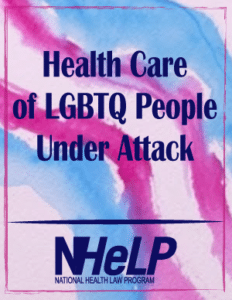 *Editor’s Note: This piece was updated in October following recent action by U.S. Attorney General Jeff Sessions.
*Editor’s Note: This piece was updated in October following recent action by U.S. Attorney General Jeff Sessions.
Over the past few months, the Department of Justice (DOJ) led by Attorney General Jeff Sessions, the former Alabama senator, and longtime opponent of civil rights and voting rights, has made clear that it does not seek to protect lesbian, gay, bisexual, transgender, queer or questioning (LGBTQ) people from discrimination.
Let us first examine how Sessions’ DOJ remarkably inserted itself into a case before the U.S. Court of Appeals for the Second Circuit where the government is not even a party, arguing it does not consider workplace discrimination against LGBTQ individuals to be discrimination under federal civil rights laws. The same day the DOJ filed its remarkably unwelcome amicus brief in the Second Circuit case, President Trump tweeted his plans to bar transgender people from the military — and later when he did issue the Trans ban he cited totally unfounded medical costs of transgender people as part of his reasoning.
The DOJ”s position in the Second Circuit is directly at odds with the Equal Employment Opportunity Commission and the position held by the Obama administration. (As Slate‘s Mark Joseph Stern writes, the Second Circuit did not ask for the DOJ’s input in this case, partly because the EEOC had already decided that Title VII of the Civil Rights Act of 1964, which bans sex discrimination in the workplace also prohibits discrimination against LGBTQ workers.) Stern continued, that the DOJ’s stance in opposition to the EEOC was soundly rebuked by the Second Circuit judges. Nevertheless, Sessions, bent on pressing the matter, recently issued a sweeping memorandum to DOJ attorneys that the EEOC was wrong, and that the Civil Rights law does not protect transgender workers from discrimination. It is a blunt example of how vehemently anti-LGBTQ the attorney general is.
In another egregious example, the DOJ weighed into a case before the Supreme Court, arguing that a baker who is religiously opposed to gay marriage should not be forced to make wedding cakes for same-sex couples. The DOJ stood anti-discrimination law on its head–arguing that requiring the owner of Masterpiece Cakeshop in Colorado to create a wedding cake for a gay couple under public accommodations laws would violate the baker’s constitutional rights.
It is clear that the DOJ and Trump administration will not stop here. The reasoning they espouse will most certainly be used to sanction discrimination against LGBTQ people seeking health care for themselves or their family members. In fact, they already have their sights on health care discrimination laws in the Affordable Care Act (ACA), as they are reassessing the Act’s anti-discrimination protections.
The ACA’s Section 1557 prohibits any health program or facility that receives federal funds from discriminating because of race, color, national origin, age, disability, or sex. This includes hospitals and health care providers that participate in Medicare or Medicaid, state Children’s Health Insurance Programs (CHIP), health insurance plans that participate in the insurance marketplaces in every state, as well as many other programs. Section 1557 marked the first time that a federal anti-discrimination law specifically aimed to end discrimination in health care settings. The final rule implementing section 1557, issued in 2016 by Department of Health and Human Services HHS Office of Civil Rights (OCR), defines the sex protections in Section 1557 to include discrimination against LGBT people, including individuals who are lesbian, gay, bisexual, or transgender.
However, on December 31, 2016, a Texas Federal District Court issued a nationwide injunction prohibiting HHS from enforcing Section 1557 protections against discrimination based on gender identity (and pregnancy termination). In that case, Franciscan Alliance v. Burwell, the Justice Department has, so far, refused to defend the lawsuit or the OCR rules, informing the court instead that it has plans to “fix” the problem by changing the rules altogether. If this happens, LGBTQ people will not be protected from discrimination when they seek critical health care services—something that everyone, regardless of their sexual orientation or identity, will do.
This administration’s views are not only out of touch with the times, they present a dangerous slippery slope that will roll back the rights of the most vulnerable Americans. We must stand up for the policies that have provided critical protections for millions of LGBTQ individuals and reject policies that take us back to a darker time in history, where discrimination is sanctioned, and even encouraged, by our own government.